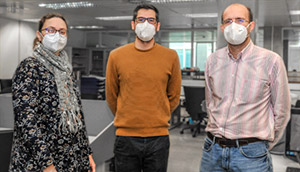
The Universitat Politècnica de València (UPV), through the group of Technological Innovations for Health and Well-being (SABIEN) of its Institute of Applications of Information and Communication Technologies (ITACA-UPV), coordinates the ESCAPE4HEALTH project, co-financed by the Erasmus + program of the European Union and whose objective is to explore the potential of escape rooms in the field of education and health training.
They facilitate the learning of complex concepts
“Both technical and non-technical clinical skills are essential for medical and health students and professionals,” says Álvaro Fides (SABIEN-ITACA), “and recently, scientific articles such as that by Oscar Rosenkrantz and others, have detailed how the non-technical ones can be transferred to a simulation-based training environment ”.
The model is that of escape rooms, challenging teams of participants to solve a series of tests and puzzles in a closed thematic space with the aim of reaching a certain goal in a limited time.
«This approach,» says Fides, «provides a valuable perspective on the dynamics of teamwork, and exercises like these have great potential to facilitate the learning of complex concepts.»
Geared towards Generation Z students
Mainly, ESCAPE4HEALTH is aimed at “new students of the so-called Generation Z” – born, approximately, between the second half of the 90s and the first decade of the 21st century – “who prefer more innovative styles of education, such as gamification, that defy their expectations. This provides them with a greater interprofessional learning experience than the one they could have in a conventional center.
Furthermore, it should be taken into account that the project «will go beyond the traditional escape room», continues the UPV researcher, «by introducing scenarios within virtual reality and augmented reality environments».
The usefulness of virtual reality
«The usefulness of virtual reality in this context has already been demonstrated», explains Fides, adding that it «will allow remote teaching to be carried out, facilitating its deployment in facilities where there is little space or lack of props for a conventional escape room. in addition to mitigating the problem of face-to-face education during the current pandemic or similar situations in the future ”.
Ultimately, the project will analyze the validity and acceptance of escape rooms in the health curriculum, involving students, teachers and administrators during the creation of these experiences.
Participants
Together with the UPV, ESCAPE4HEALTH is made up of four other European institutions: the Laurea University of Applied Sciences (Finland), the Aristotle University of Thessaloniki (Greece), the Association for Medical Education in Europe (United Kingdom), and the Region of Hovedstaden (Denmark).
For the UPV, Vicente Traver Salcedo (SABIEN-ITACA director and official coordinator), Lucía Aparici Tortajada, Manuel Traver Salcedo and Álvaro Fides Valero participate in the project.
Source: UPV’s Information Office



